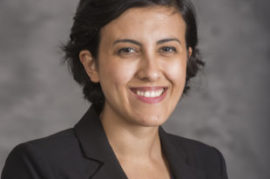“Forget about the things you learned in leadership classes. They will be more destructive to your career than being helpful.”
When Alex Haslam, professor of psychology and ARC Laureate Fellow at the University of Queensland, started his McDonnell International Scholars Academy symposium workshop by saying this, I knew that something I felt but could not understand or explain by myself was going to be uncovered by him. In his talk, he explained where the destructiveness of leadership classes come from and what kind of alternative understanding we need.
The mainstream leadership concept focuses on the individual leader’s skills instead of the group’s values. We are persuaded that achieving organizational goals totally depends on the leader’s skills, there is a strong emphasis on “I-ness” instead of “We-ness.” The leader becomes a figure that tries to isolate herself/himself from the group by having superior skills, by being different, instead of developing a sense of commonality with the people around her/him. In leadership classes, we take sophisticated tests to measure our skills and always hear good things about ourselves.
The reality is, leadership is never just about leaders; it is mostly about followers.
It is not about making yourself different from others, it is about creating a sense of commonality with people around you. If the leader is not able to create a shared group identity in the group to mobilize and influence others, there is no leadership that we can talk about.
This mobilization process is a group process rather than an individual’s success. Because if there is no shared identity in the group, it is very hard to mobilize a group of people toward a goal. Apart from enhancing a shared identity, a leader’s role is to help the group members become healthier individuals instead of pushing them into competition with each other. He explains the theory (Social Identity Approach) behind these views in the book “The New Psychology of Leadership: Identity, Influence and Power.”
Now imagine millions of unhappy people at their workplaces, being forced to have all the qualities of a single “super leader” instead of expressing their individual values, incentivized to compete for having the “best skills” among their team and “beating others” in the competition instead of contributing to a collective learning. I know from my Y-generation friends that this work environment does not work for us anymore, so we are blamed by our managers and families for being different, not loyal, and having a strong desire to leave the big institutions we are in. In reality, though, all we need is a different understanding of leadership from our leaders. As the new generation of future leaders, including the McDonnell Academy Scholars, I hope that we can become good representatives of this new leadership philosophy.

Photo by Mary Butkus/WUSTL Photos
Guest Blogger: Gulcan Yayla, McDonnell Scholar, Olin MBA’17
The McDonnell International Scholars Academy provides the network with which Washington University in St. Louis incubates new ideas and mentors future leaders. Through our partnerships, we lead groundbreaking research projects and prepare our Scholars to be effective leaders in a global community.



